How to Treat a Concussion
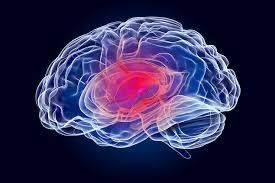
A concussion is a mild traumatic brain injury that occurs when there is trauma to the head, leading to a rapid acceleration and deceleration of the brain within the skull. This mechanism, often referred to as coup-contrecoup or shearing injury, can disrupt the delicate structures of the brain. While direct impacts to the head, face, or neck are common causes, concussions can also result from whiplash or even exposure to explosions.
It’s important to clarify that imaging tests, such as CT scans or MRIs, do not diagnose concussions effectively. These injuries can cause diffuse axonal shearing, which may not be visible through traditional imaging methods. Current research emphasizes that each concussion is unique, and once you’ve experienced one, your risk for future concussions may increase.
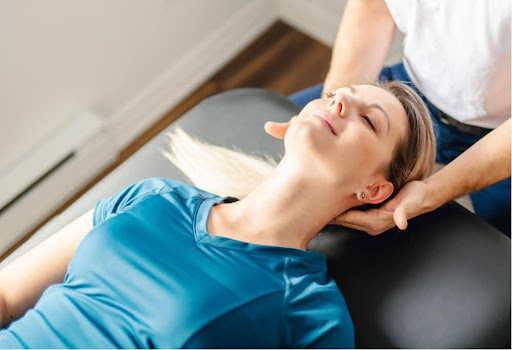
At Symmetry Physical Therapy, we are here to support your recovery through education and tailored treatment strategies. Understanding the nature of your injury is the first step toward effective rehabilitation. Let’s work together to help you regain your health and well-being.
As physical therapists specializing in concussion management, we recognize that a concussion triggers a complex metabolic response in the brain. This process leads to an “energy crisis” at the cellular level that traditional imaging cannot capture. Following a concussion, glucose metabolism is disrupted, resulting in increased energy demands alongside reduced cerebral blood flow. This combination can impair axonal function, contributing to your symptoms.
Our role is to facilitate healing by promoting increased blood flow to the brain, which is crucial for recovery. By addressing these metabolic challenges, we can help support your brain’s healing process and improve your overall function. Let us guide you on the path to recovery with targeted strategies tailored to your needs.
What Type of Symptoms Should I Expect After a Concussion?
Concussions can present a wide range of symptoms, and their severity often varies significantly from one individual to another. A concussion is considered a mild traumatic brain injury with varied symptoms and clinical presentations, and will generally fit within the following categories (cognitive, ocular-motor, headache/migraine, vestibular, and anxiety/mood) and two associated conditions (cervical strain and sleep disturbances).
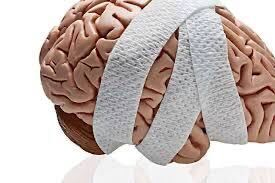
Common symptoms include:
- Headaches
- Dizziness
- Balance issues
- Fatigue
- Nausea
- Sensitivity to light or noise
- Difficulty concentrating
- Memory problems
- Mood changes
Our specialized therapists conduct thorough evaluations to assess these symptoms and their impact on your daily life. This comprehensive approach allows us to create a personalized treatment plan that addresses your specific challenges and guides you toward a successful recovery. By understanding the unique nature of your concussion, we can help you regain your health and return to your normal activities.
What is a Sports Related Concussion?
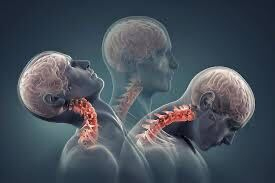
For athletes, if a concussion occurs during play, it’s crucial to follow a structured evaluation process. Many sports teams have trainers who conduct baseline concussion testing before the season. These assessments provide a reference point for comparing symptoms and data after an athlete sustains a concussion. One commonly used tool is the SCAT 6 test, a sideline assessment that evaluates balance, memory (both long-term and short-term), neurological function, and the neck/cervical spine. This quick test typically takes about 10-15 minutes to complete. Additionally, the VOMS test focuses on vestibular function, assessing balance centers, visual reflexes, and motion sensitivity.
After compiling the results of these tests, we will determine the appropriate next steps for recovery. It’s essential for athletes to be honest and provide accurate information about their symptoms, regardless of their desire to return to play. This honesty is vital for ensuring a safe recovery and minimizing the risk of further injury.
How Can I Ensure a Safe Return to School/Work and Sport After Injury?
At our physical therapy clinic, we understand that concussions can happen both during sports and in everyday life, and many students and athletes are concerned about returning to school or work after an injury. While limited data supports the idea of “cognitive rest,” it’s important to recognize that returning to school can bring challenges. Students may face a significant amount of makeup work and increased demands, which can be overwhelming.
To support a safe return, adjustments, and modifications are essential. We advocate for a graded exposure approach, allowing students to gradually reintegrate into their academic responsibilities at a pace that suits their recovery. This is not a one-size-fits-all solution; instead, a person-centered approach is most effective. By tailoring strategies to the individual’s needs, we can help student-athletes progress alongside their peers while ensuring their well-being is prioritized. Our team is here to guide you through this process and support your recovery every step of the way.
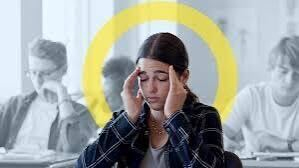
Some academic/work accommodations to consider:
- Excused absences / PTO/ Sick leave
- Sensory overload breaks
- Extension for exams and or work assignment
- Phono or photosensitivity accommodation, closing blinds, or wearing darkened glasses
- Appropriately balancing new material and make-up material to no overload
- Changing seating arrangements
- Establishing IEP plans if necessary
When Can I Play Sports After My Concussion?
Graded systematic activity with a skilled physical therapist post 48 hours can assist with increasing blood flow to the brain. Studies found that those who participated in exercise within 48 hours demonstrated faster recovery and lower-rated post-concussion symptoms.
Research has shown that prolonged rest after the first couple of days might hinder rather than help symptoms. This might leave you feeling like what next then? Here at Symmetry Physical Therapy Downtown Miami/Brickell, we can be the main guide to gradually progress you toward your physical goals post-concussion. We use objective testing such as the Buffalo Treadmill Test to give specific guidance on heart rate-based programs for our athletes. This is a research-based test that allows us to create a customized program based on our patient’s heart rate and symptom exacerbation response to exercise. This allows our patients to progressively load their bodies and adapt to the onset of symptoms without risking acute exacerbation and provocation of symptoms.
Your recovery is an important part of your healing journey and having expertise that can guide you through any type of symptoms is extremely important.
If you happen to be an athlete or a student-athlete, we will keep in close contact with your physician, Coaches, and trainers to keep all informed on progress and what needs to be done.
When Will I Feel Better From My Concussion?
No one wants to be a Miami athlete sitting on the sidelines. Recovery from a concussion is a highly individualized process that varies significantly from one person to another. It’s important to recognize that symptom recovery does not follow a set timeline; instead, it involves many variables, including the nature and severity of the injury, the individual’s overall health, and their unique symptom profile.
Recovery is not simply a passive journey from injury to full activity. Instead, it requires a gradual increase in activity levels to promote optimal healing. This process, known as graded exposure, helps ensure that each person can safely reintroduce physical and cognitive demands as their symptoms allow.
While we may refer to generalized guidelines for recovery, it’s crucial to understand that these are just that—guidelines. The timeline for achieving 100% recovery can differ widely based on each individual’s experience and symptomatology. Our goal is to provide a person-centered approach, closely monitoring your progress and adjusting your recovery plan based on your specific needs. By doing so, we aim to support you in achieving a safe and effective return to your daily activities.
How Physical Therapy Can Treat Your Concussion at Symmetry Physical Therapy?
We offer comprehensive concussion evaluations and develop tailored rehabilitation programs designed to meet your specific needs. Our approach includes a variety of effective treatments:
- Manual Therapy: For patients experiencing cervicogenic and vestibulo-ocular post-concussion syndrome, our manipulation and mobilization techniques target the cervical and thoracic spine. This therapy aims to reduce pain, improve joint movement, reset positional mechanoreceptors, and alleviate headaches.
- Dry Needling: Dry needling in the cervical, temporal, and occipital regions has proven effective for managing pain, headaches, and dizziness associated with post-concussion syndrome. Recent findings from our therapists suggest that dry needling can be particularly beneficial for addressing cervicogenic dizziness.
- Winback Tecar Therapy: This innovative therapy, along with high-intensity laser treatment, enhances vascular permeability, reduces inflammation, and promotes healing in soft tissue affected by concussions and whiplash-associated disorders.
- IASTM (Instrument-Assisted Soft Tissue Mobilization): This technique helps to improve tissue mobility and promote healing in affected areas.
- Vestibular Rehabilitation: Strong evidence supports the effectiveness of vestibular rehabilitation for conditions such as benign paroxysmal positional vertigo and vestibular-ocular dysfunction. Repositioning maneuvers and ocular-motor habituation exercises often lead to significant symptom relief within just 1-2 sessions.
- Strengthening Exercises: We focus on exercises that target the deep cervical neck flexors, enhance neck proprioception, improve gaze stability, and boost overall balance and vestibulo-ocular control. These evidence-based exercises are crucial for patients with post-concussion syndrome.
Read More about Concussions here
By utilizing a combination of these therapies, we aim to support your recovery process and help you regain your full function. Our personalized approach ensures that your rehabilitation journey is tailored to your unique symptoms and recovery goals.
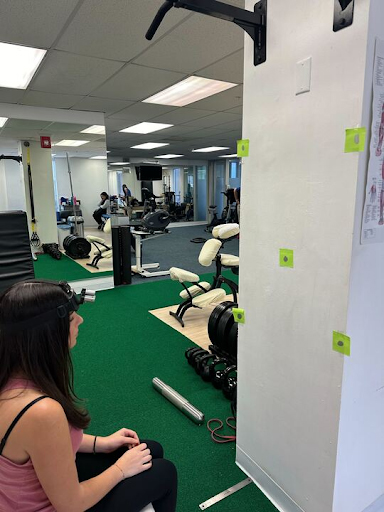
(Laser light headlamp training for proprioception)
At Symmetry Physical Therapy Downtown Miami, we have advanced-level training specifically on the evaluation and treatment of post-concussion syndrome. If you are a Miami local and continuing to experience symptoms associated with a concussion, please come and see us and we will tailor a concussion recovery program specifically for your needs.
Feel free to give us a call at (305) 331 2277 to schedule an appointment.
